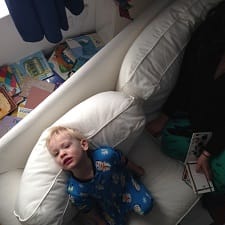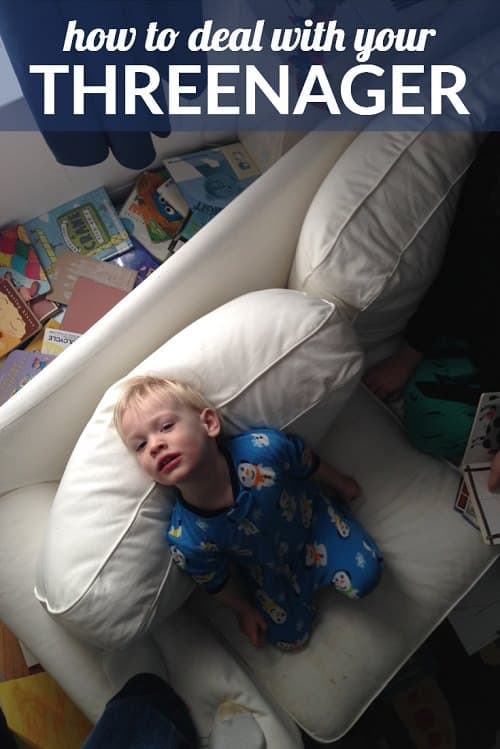How to Handle a Defiant Three Year Old
This post may contain affiliate links and CorporetteMoms may earn commissions for purchases made through links in this post. As an Amazon Associate, I earn from qualifying purchases.

Readers, what are your best tips for how to handle a defiant three-year-old, aka the threenager (or a kiddo in the terrible twos)? How do you deal with discipline as a working parent in general — and how do you get your nanny or babysitter on the same page?
Everyone says the that the twos are terrible, but for us it was the threes that have been truly, truly horrible with both kids. When my eldest, J, was a threenager, we were giving him time-outs on a regular basis.
(That’s him pictured — after a particularly rough night we woke up to find that he had stripped the bookshelves in his room and thrown all of his books in a pile behind the couch in his room. Sadly, I have no good picture of the time he painted the same couch with poop.)
We were constantly frustrated and screaming, and it felt like we were never, ever, ever going to be able to live in peace with our child again. Then, one day we sort of looked at each other and said, “Huh… we haven’t given J a time-out in a thousand years. That’s so weird.” It had just sort of ended.
Now he’s a perfectly insane six-year-old who gets up to his own mischief, but thankfully we’re mostly past the screaming/time-out stage of things. But: now my youngest, H, is three and a half, and if the slightest thing goes wrong, he is screeching and screaming. He excels at making messes, and his favorite thing right now is taking a pillow and throwing it to knock things off of high shelves. Charming!
(It’s also interesting to note that in the classic, must-read POOPCUP article, this is a growth stage for parents also — the article was joking about how parenting is pretty easy for “parents of one perfect child under preschool” age, but stuff starts to hit the fan once you get into the preschool weeds. Here’s our whole roundup on great articles on pregnancy and motherhood…)
We’ve always favored time-outs in the tradition of the book 1-2-3 Magic (affiliate link) because things like sticker charts don’t seem to be sufficient motivation for either kiddo — but in writing this post I’ve realized there’s some drama around the theory of time-outs, so now I’d really love to hear what you guys say!
How have you handled a defiant three-year-old in the past — and what disciplinary methods have you preferred? How do you generally handle discipline with your children? How have you communicated those desires to your nanny, au pair, babysitter, or other childcare provider?


Whole Brain Child, and No Drama Discipline by the same authors, have been incredibly helpful for our family. We don’t do time outs but try to lead our 3 year old to see natural consequences (and set a lot of boundaries so there are natural consequences). Tantrums still happen, but instead of focusing on punishment, just the mindset shift that to discipline is to teach has helped us keep the gray hairs to a minimum. Plus understanding the science behind what’s goibg on in our kids’ brains helps us from taking their behavior personally. These methods are A LOT of work, but I feel good about the impact they appear to be having on the kiddos.
Thank you for posting this. We are struggling – struggling – with with our four year old. Time outs don’t work, talking doesn’t work. Trying out How to Talk So Kids will Listen…
At wits end. Transitions are hard. He wont listen at all. Solidarity and please share if you found something that worked.
Thanks for all of the replies to this post, especially anon right above me. That has really struck a chord. I’m not sure we are ready to pull the plug on daycare, but it will help me be a little more patient and help my thinking about how to structure weekend days.
Maybe this isn’t helpful, but I’ve found that parenting my 3-4 yo became much easier after I pulled her from daycare. She was fine in daycare and liked her class and teachers, but she was exhausted all of the time (and often recovering from some daycare bug). By the time we picked her up in the evening she was overstimulated and spent. And waking up the next morning she never wanted to do anything but lounge in her PJs, despite us rushing her to get ready. We spent 5 days a week fighting, with her melting down over and over. Weekends were spent recovering from a week of stress. We always had a happy family on Sunday nights, but then the week would start over again.
This year we switched to an au pair plus part time preschool. She’s a totally different kid. She’s able to handle minor grievances without melting in the evening and wakes up excited for the day’s adventure. She gets lots of playtime at home, tons of creative craft time, and daily trips to the playground. She gets to stay home longer when sick (instead of me rushing her back so I can go to work) so now she fully recovers from bugs. It’s been night and day for us. I don’t think any discipline or behavioral strategy works on a strung out kid. They’re just too spent to even try to cope.
The article linked above is indeed excellent, but I am exceedingly skeptical of the claim that 2-year-olds don’t understand that they are individual people and will do whatever the parents want them to do. I am pretty sure that my child was born understanding that she was her own person. One of her first and most oft-repeated sentences was “I do it myself!” And she never liked pancakes just because daddy liked pancakes, or sat in time-out to please us. Are there really 2-year-olds who think they are extensions of their parents? I don’t think I’ve ever met one.
Ages 2.5-3.5 are the worst for my kids. The most effective preventative in my house is routine and consistency. It’s incredibly hard to do, but if I say “no more milk until you pick up your toys” I have to stick with it, even if I want to give in an hour later.
Time outs work sometimes, but I have to totally ignore the kid. We never make it to the full minute-per-age because I basically use it as a way to let them think about the lesson on their own – as soon as they can get up, say sorry, and tell me the lesson (like “Never pull the dog’s tail”), they get to come get a big hug. But sometimes you can just tell they won’t calm down on their own, so I skip the time out and do a “time in” where I hold them on my lap and help them work through the big emotions.
Neither DH nor I were raised in households where Big Emotions were okay, so we’re working hard to learn/model the right ways to express them. We do a lot of talking – “Are you sad because you wanted to play with the toy? You wanted him to give it to you? That would make me sad too. It’s hard to wait your turn, isn’t it? What would help you feel better while you wait? Oh, good idea, let me go get the play dough and we can play together while you wait.” A lot of times, just giving them a way to name the emotion and a way to think through it will help calm the tantrum. Other times, I’m the person carrying my screaming child through the grocery store parking lot. Cest la vie, I guess.
janet lansbury’s articles are really helpful for me. e.g. http://www.janetlansbury.com/2012/10/if-gentle-discipline-isnt-working-this-might-be-the-reason/
Umm, yes. I tell people with soon-to-be 3 year olds that the job of parenting becomes much more intellectual and emotionally draining, versus just “tending to physical needs and being tired.” I leaned heavily on “How To Talk So Kids Will Listen” (although there is a new one for little kids now!) and tried to be really empathetic, but establish firm boundaries with the help of All The Timeouts. I can understand that a kid is mad/frustrated/scared/upset, and still insist that we use inside voices, treat other people’s bodies with respect, and don’t destroy stuff.
It feels like I’m entering a repeat stage now though – is this a normal thing at 4?
So timely! I have a three year old and we have had these issues. DH likes to use tantrums as a time to teach a lesson and the difference between right and wrong. That usually escalates the tantrum and I have to step in. My approach is to be imaginative and create stories and play to get stuff done. Tough to do for every situation, especially after a long day at work.
This post really helped:
https://www.washingtonpost.com/lifestyle/on-parenting/why-is-my-3-year-old-suddenly-so-disagreeable/2018/02/27/6f151e20-1746-11e8-92c9-376b4fe57ff7_story.html?utm_term=.96934009da76